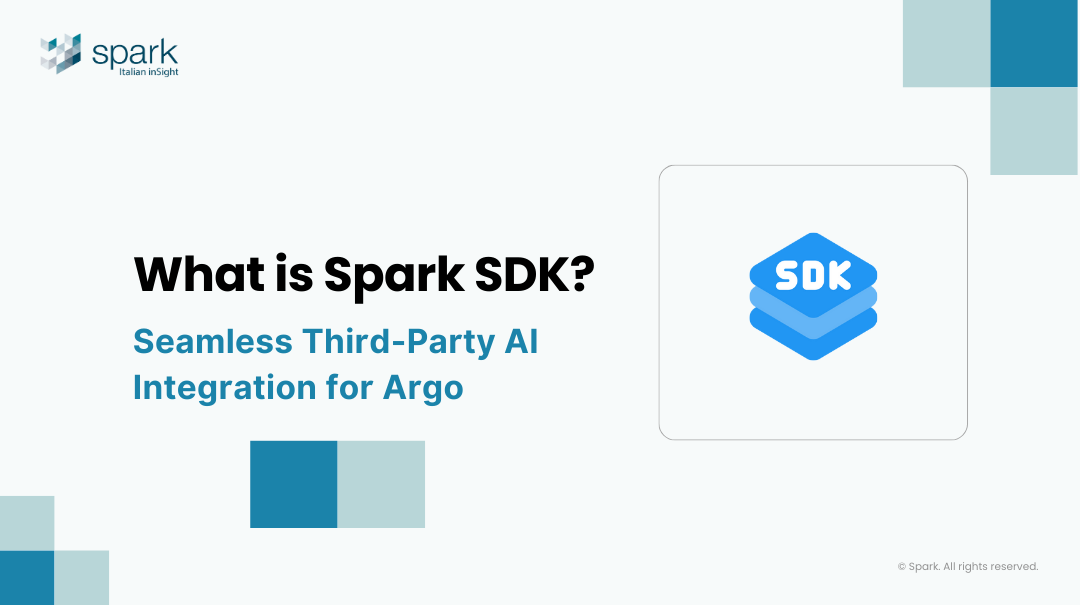2025.09.03
Integrating multiple AI technologies efficiently while ensuring system stability and accurate event detection is a key challenge in intelligent surveillance and video management. The Spark SDK provides a standardized, cross-industry toolkit that allows third-party AI modules to seamlessly connect to the Argo platform. Vendors can focus on AI development without building a full system, enabling rapid deployment, testing, and real-time video analysis. From factory safety and campus management to community monitoring and traffic surveillance, the SDK delivers a flexible, scalable AI solution for diverse applications.

Spark SD and Argo Generic AI
What is Spark SDK?
Spark SDK is a standardized software development kit (SDK) provided by the Argo platform. It offers unified interfaces and comprehensive documentation for third-party AI vendors, enabling them to quickly integrate AI modules into the Argo system.
Key Features:
-
Cross-Industry Compatibility: Applicable across factories, campuses, communities, retail, traffic, and other diverse scenarios.
-
Modular Design: Includes sample code and extension templates to lower development barriers.
-
Standardized Event Schema: Ensures outputs from different AI modules can be consistently parsed and managed by the Argo platform.
How Third-party AI Modules Integrate with Argo AI VMS
-
Install Spark SDK
Third-party vendors download and install the SDK, which includes full documentation and example code. -
Develop and Test
Use SDK APIs to develop Argo-compatible plugins and test data interaction between AI modules and the VMS. -
Deploy to Argo Platform
Deploy the tested AI module to the Argo system, enabling real-time video streaming and event interaction through the SDK. -
Scenario-Based Optimization
Optimize integrated AI features via the Argo management interface to meet practical business requirements and scenario-specific needs.
Core Advantages of Argo Generic AI
-
Core Advantages of Argo Generic AI
-
Lower Technical Barriers: Vendors can focus solely on AI development without building a full system from scratch.
-
Rapid Deployment: Standardized interfaces enable fast integration, shortening development and deployment cycles.
-
Enhanced Competitiveness: Integrating multiple AI technologies provides more features and applications, catering to diverse industry needs.
Cross-Industry Applications of Argo Generic AI
Spark SDK supports AI integration across multiple industries and scenarios:
-
Factories: Safety monitoring and equipment management in chemical, manufacturing, and logistics facilities.
-
Campuses: Security and access control for people and vehicles.
-
Communities: Smart community surveillance and alert management.
-
Retail: Loss prevention, customer flow analysis, and intelligent operations.
-
Traffic Management: License plate recognition, traffic monitoring, and event alerts.
Through Spark SDK, AI modules can be rapidly connected to the VMS, enabling real-time video analysis, event triggering, and intelligent management, forming a cross-industry generic AI solution.
Integrating multiple AI technologies efficiently while ensuring system stability and accurate event detection is a key challenge in intelligent surveillance and video management. The Spark SDK provides a standardized, cross-industry toolkit that allows third-party AI modules to seamlessly connect to the Argo platform. Vendors can focus on AI development without building a full system, enabling rapid deployment, testing, and real-time video analysis. From factory safety and campus management to community monitoring and traffic surveillance, the SDK delivers a flexible, scalable AI solution for diverse applications.

Spark SD and Argo Generic AI
What is Spark SDK?
Spark SDK is a standardized software development kit (SDK) provided by the Argo platform. It offers unified interfaces and comprehensive documentation for third-party AI vendors, enabling them to quickly integrate AI modules into the Argo system.
Key Features:
-
Cross-Industry Compatibility: Applicable across factories, campuses, communities, retail, traffic, and other diverse scenarios.
-
Modular Design: Includes sample code and extension templates to lower development barriers.
-
Standardized Event Schema: Ensures outputs from different AI modules can be consistently parsed and managed by the Argo platform.
How Third-party AI Modules Integrate with Argo AI VMS
-
Install Spark SDK
Third-party vendors download and install the SDK, which includes full documentation and example code. -
Develop and Test
Use SDK APIs to develop Argo-compatible plugins and test data interaction between AI modules and the VMS. -
Deploy to Argo Platform
Deploy the tested AI module to the Argo system, enabling real-time video streaming and event interaction through the SDK. -
Scenario-Based Optimization
Optimize integrated AI features via the Argo management interface to meet practical business requirements and scenario-specific needs.
Core Advantages of Argo Generic AI
-
Core Advantages of Argo Generic AI
-
Lower Technical Barriers: Vendors can focus solely on AI development without building a full system from scratch.
-
Rapid Deployment: Standardized interfaces enable fast integration, shortening development and deployment cycles.
-
Enhanced Competitiveness: Integrating multiple AI technologies provides more features and applications, catering to diverse industry needs.
Cross-Industry Applications of Argo Generic AI
Spark SDK supports AI integration across multiple industries and scenarios:
-
Factories: Safety monitoring and equipment management in chemical, manufacturing, and logistics facilities.
-
Campuses: Security and access control for people and vehicles.
-
Communities: Smart community surveillance and alert management.
-
Retail: Loss prevention, customer flow analysis, and intelligent operations.
-
Traffic Management: License plate recognition, traffic monitoring, and event alerts.
Through Spark SDK, AI modules can be rapidly connected to the VMS, enabling real-time video analysis, event triggering, and intelligent management, forming a cross-industry generic AI solution.


